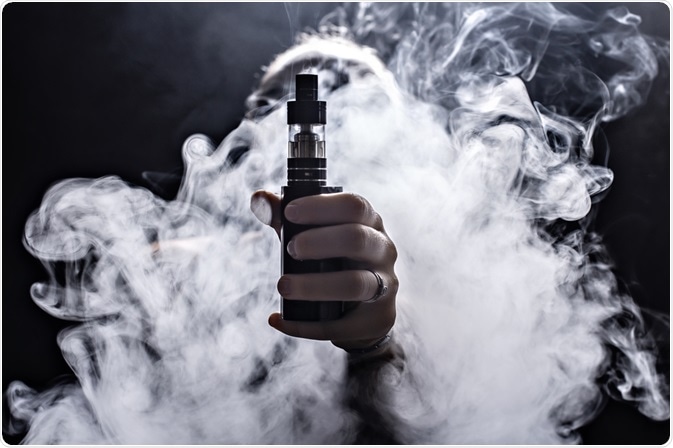Electronic cigarettes or vapes are now commonly used as an alternative to smoking cigarettes, or as a method to stop or reduce smoking. Many argue that vaping is less harmful than smoking regular cigarettes because they contain fewer chemical components. However, contrasting research suggests that vaping may cause a variety of adverse health effects.
 Image Credit: SVETOV DMITRII / Shutterstock.com
Image Credit: SVETOV DMITRII / Shutterstock.com
Is Vaping Bad for your Health?
Electronic cigarettes, also known as vapes and e-cigs, are battery-powered devices that aim to simulate the experience of regularly smoking cigarettes. To work, they heat a vape liquid containing nicotine, solvent carriers, and other chemicals to a specific temperature, which causes the liquid to turn into a vapor. This vapor is then inhaled and exhaled.
As vapes are relatively new and evolving, there is a lack of knowledge surrounding long-terms health consequences. Due to a lack of regulation, it can difficult to establish the specific chemicals or concentrations users of vapes inhale. Nevertheless, emerging research proposes several adverse conditions and diseases associated with vape use.
Vaping and Cardiovascular Health
The liquids of vapes have been found to contain glycerol and propylene glycol. When these substances are heated, they form aldehydes following oxidation. Formaldehyde (a carcinogen) and acrolein are two oxidizing agents found in vape liquid. Sustained exposure to such chemicals is linked to an increased risk of developing cardiovascular issues.
Similar research has found that vape users are 56% and 30% more likely to suffer a heart attack or stroke, respectively, compared to nonusers. Other cardiovascular issues reported include blood clot formation and coronary heart disease.
Vaping and Respiratory Health
Case study data suggests that vaping may cause adverse effects on the respiratory system following the case of a woman who was diagnosed with lipoid pneumonia, which was thought to have been caused due to the inhalation of a glycerin-derived oil found in vape liquid.
Subsequent research has found that when the chemical flavorings are heated, they react with other chemicals producing acetals. Inhaling these flavored compounds is suggested to irritate the airways, causing an inflammatory response within the respiratory system. Additional effects linked to short-term use include the development of chronic cough and mucus.
In the United States, the Centers for Disease Control and Prevention are leading an outbreak investigation to understand better what has been termed e-cigarette or vaping product use associated with lung injury (EVALI). Thus far, over 2100 cases have been reported, and 42 deaths have occurred by users of vaping products. The CDC is recommending that all persons avoid using vaping and e-cigarette products, pending the resolution of this outbreak.
Vaping and Mental Health
Research investigating the effect of regular vape use and mental health suggests that users are more likely to have affective disorders. Researchers found that those who used vapes daily were more likely to be diagnosed with anxiety and depression.
Vaping and Nicotine Dependency
Many use vaping as a method to wean themselves from traditional cigarette smoking. However, many health professionals worry that vaping – as a nicotine delivery system – may be causing nicotine dependency in adults and high school-aged children. Flavorings in vaping products have also been associated with increased nicotine intake.
Complementary research has shown that people who start smoking vapes are more likely to then move onto traditional cigarette smoking, compared to non-vape users. This trend is mainly considered to affect young people and adolescents and may be caused by the onset of nicotine addiction amongst users.
Vaping to Quit Smoking
The US Food and Drug Administration has not approved the use of vapes for smoking cessation due to conflicting and limited rigorous data concerning the long-term implications. However, traditional smoking cessation methods, such as nicotine replacement chewing gums, nasal sprays, and skin patches, are recommended by healthcare providers and health authorities.
In the UK, the NHS argues that using an e-cigarette may increase your chance of quitting smoking. However, it has been noted that when used in conjunction with face-to-face support, those who used vaping to stop smoking were twice as likely to stop when compared to those using nicotine replacement products solely.
It is important to note that many of the studies within this field have found small effects suggesting more extensive research is needed to analyze the implications of long-term usage. Furthermore, some studies fail to establish causality with their research, only establishing a correlational relationship between the variables.
Sources
- Darville, A., & Hahn, E. J. (2019). E-cigarettes and Atherosclerotic Cardiovascular Disease: What Clinicians and Researchers Need to Know. Coronary Heart Disease. DOI: https://doi.org/10.1007/s11883-019-0777-7
- Vindhyal, M. R., Ndunda, P., Munguti, C., Vindhyal, S., & Okut, H. (2019). Impact on Cardiovascular Outcomes Among E-cigarette Users: A Review from National Health Interview Surveys. Journal of the American College of Cardiology. DOI: 10.1016/S0735-1097(19)33773-8
- NHS (2019). Using e-cigarettes to stop smoking. www.nhs.uk/live-well/quit-smoking/using-e-cigarettes-to-stop-smoking/
- Erythropel, H. C., Davis, L. M., Winter, T. M., Jordt, S. E., Anastas, P. T., … Zimmerman, J. B. (2019). Flavorant-Solvent Reaction Products and Menthol in JUUL E-Cigarettes and Aerosol. American Journal of Preventative Medicine. DOI: https://doi.org/10.1016/j.amepre.2019.04.004
- www.cdc.gov/.../severe-lung-disease.html
Last Updated: Nov 26, 2019